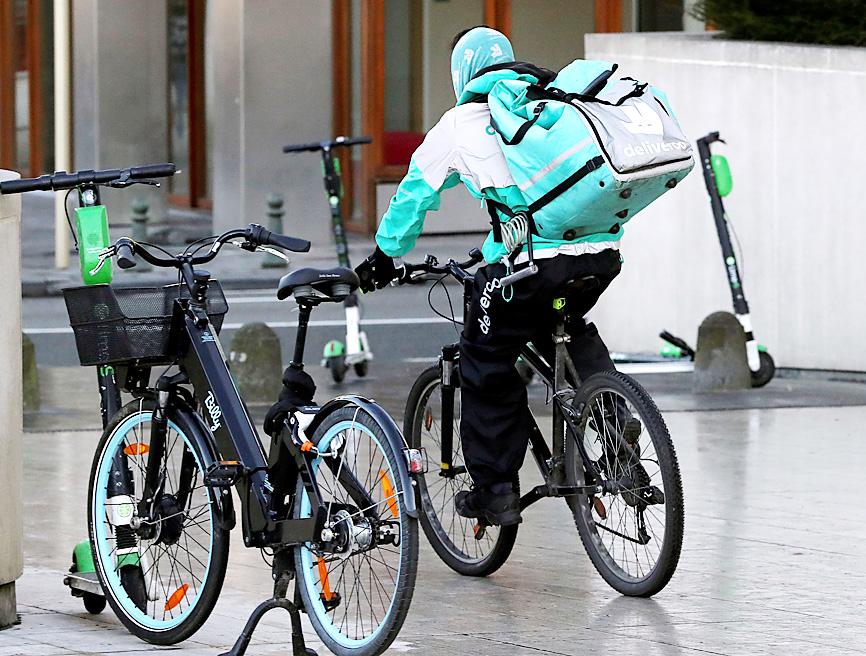A trade union yesterday called for Deliveroo’s UK riders to strike when the meal delivery service floats on the stock market next month, saying the action would highlight dissatisfaction with the company’s business model and approach to workers’ rights.
Deliveroo, whose turquoise-uniformed couriers delivering chicken kormas and hot pizzas are a common sight in many British suburbs, is set for Britain’s biggest stock market debut in nearly a decade, after setting a share price range that values it at up to US$12 billion.
Some investment firms have said they will not participate in the initial public offering (IPO).

Photo: Reuters
Insurer Aviva PLC for instance highlighted a lack of rights for riders as an investment risk as the company might be forced to change its business model.
Investor demand had continued to build since its road show began on Monday last week, Deliveroo said, adding that the views of the Independent Workers’ Union of Great Britain (IWGB), which called for the strike, did not represent the majority of riders.
The union previously lost a legal challenge to Deliveroo in 2018. The case sought to secure rights such as the UK minimum wage for riders, but the court ruled that riders were self-employed.
“Investing in Deliveroo means associating yourself with the exploitative and unstable business model,” IWGB president Alex Marshall said in a statement, adding that the strike was planned for Wednesday next week, to coincide with the IPO.
The rights of people who work in the so-called “gig economy” have been an increasing focus in Britain. Ride-hailing app Uber gave its workers more entitlements earlier this month after losing a UK Supreme Court case.
Job satisfaction levels among its 50,000 self-employed riders in Britain was at an all-time high, and that the flexibility they had was a big attraction, Deliveroo said.
“Thousands apply to work with us every week, reflecting the strong demand for our on-demand model,” a company spokeswoman said.

TAKING STOCK: A Taiwanese cookware firm in Vietnam urged customers to assess inventory or place orders early so shipments can reach the US while tariffs are paused Taiwanese businesses in Vietnam are exploring alternatives after the White House imposed a 46 percent import duty on Vietnamese goods, following US President Donald Trump’s announcement of “reciprocal” tariffs on the US’ trading partners. Lo Shih-liang (羅世良), chairman of Brico Industry Co (裕茂工業), a Taiwanese company that manufactures cast iron cookware and stove components in Vietnam, said that more than 40 percent of his business was tied to the US market, describing the constant US policy shifts as an emotional roller coaster. “I work during the day and stay up all night watching the news. I’ve been following US news until 3am

Six years ago, LVMH’s billionaire CEO Bernard Arnault and US President Donald Trump cut the blue ribbon on a factory in rural Texas that would make designer handbags for Louis Vuitton, one of the world’s best-known luxury brands. However, since the high-profile opening, the factory has faced a host of problems limiting production, 11 former Louis Vuitton employees said. The site has consistently ranked among the worst-performing for Louis Vuitton globally, “significantly” underperforming other facilities, said three former Louis Vuitton workers and a senior industry source, who cited internal rankings shared with staff. The plant’s problems — which have not

TARIFF CONCERNS: The chipmaker cited global uncertainty from US tariffs and a weakening economic outlook, but said its Singapore expansion remains on track Vanguard International Semiconductor Corp (世界先進), a foundry service provider specializing in producing power management and display driver chips, yesterday withdrew its full-year revenue projection of moderate growth for this year, as escalating US tariff tensions raised uncertainty and concern about a potential economic recession. The Hsinchu-based chipmaker in February said revenues this year would grow mildly from last year based on improving supply chain inventory levels and market demand. At the time, it also anticipated gradual quarter revenue growth. However, the US’ sweeping tariff policy has upended the industry’s supply chains and weakened economic prospects for the world economy, it said. “Now

COLLABORATION: Given Taiwan’s key position in global supply chains, the US firm is discussing strategies with local partners and clients to deal with global uncertainties Advanced Micro Devices Inc (AMD) yesterday said it is meeting with local ecosystem partners, including Taiwan Semiconductor Manufacturing Co (TSMC, 台積電), to discuss strategies, including long-term manufacturing, to navigate uncertainties such as US tariffs, as Taiwan occupies an important position in global supply chains. AMD chief executive officer Lisa Su (蘇姿丰) told reporters that Taiwan is an important part of the chip designer’s ecosystem and she is discussing with partners and customers in Taiwan to forge strong collaborations on different areas during this critical period. AMD has just become the first artificial-intelligence (AI) server chip customer of TSMC to utilize its advanced